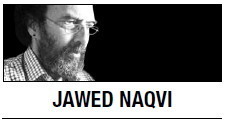 A country that was shouting “death to America” in its daily prayers for decades is shaking hands with its former foes.
A country that was shouting “death to America” in its daily prayers for decades is shaking hands with its former foes.A hemisphere removed from Iran, the tiny Cuban state, which suffered untold privations as the global symbol of opposition to American imperialism, has adjusted its stance, not in surrender but in the hope that a detente would lead to a more peaceful world order.
We can count other hopeless examples of states that have resolved their differences.
Or at least they offer a discernible reason for why an Iran-style or Cuban-type rapprochement won’t be possible in the foreseeable future.
The self-advertised love-hate relationship that has stalked India and Pakistan since their inception is a different kettle of fish.
Their odd behavior is usually explained as a quirk that comes with the everyday passion that South Asians claim they live their lives with.
It is tempting to regard it as unaddressed emotional incontinence. Should we worry about the extreme mood swings reflected in the way the India-Pakistan chest-beating alternates with their equally occult rush to clasp hands?
A quick look at the Modi-Sharif meeting in Russia reveals characteristics that are common to people prone to feelings of elation one day, and morbid depression the next.
The other day they were lunging at each other’s throats. The latest mood swings began with the inauguration of the new Indian prime minister.
If we could somehow freeze an X-ray shot of the intensity or frenzy with which both countries conduct their bilateral relationship, we would be close to an image of the convoluted-looking Indian sweetmeat called jalebi.
The countries evidently feel so vulnerable and are therefore so high-strung over their identity issues that they can even get into a serious verbal duel over the origins of jalebi.
Poor Malika Pukhraj, the lovely singer of ghazal and Dogri folk music, was pitchforked unwittingly in one such national identity dilemma.
I asked her in the 1980s during a concert in Dubai whether she agreed with the discussions going on under the Zia regime about Pakistani music being essentially different from Indian music.
As it happened, there was a calibrated maneuver underway those days in Islamabad enforcing the denial of cultural origins with India. That was part of the country’s Islamisation thrust.
A new name was foisted on the Indian Ocean and some Pakistani journalists had started calling it the South Asian Ocean.
Fortunately, Malika Pukhraj was a cultural stalwart who would not be cowed by the Zia regime, which hated her guts.
Origins of Indian classical music, or Hindustani music as she called it more precisely, were rooted in the annotations that read as “sa re ga ma pa dha ni.”
“You cannot have the ‘alif be pey’ of Urdu in Sanskrit notes. How can you create a new sargam for a new country which sings the same raags?” Pukhraj was banished from Zia’s Radio Pakistan for holding her enlightened views.
Punishing people for being sane is a feature of fascism. The syndrome from Pakistan took a while to sprout even more firmly across the border.
Nuclear war may be necessary if that is the only way to finish off the source of evil, opined one of the chiefs of the Rashtriya Swayamsevak Sangh in the 1990s.
One side hates the other so intensely that it wants to change the names of the songs that could be common to both.
The other side harbors such bile that it is willing to commit mass murder on an epic scale if that is what it takes to inflict harm on the estranged neighbor.
This is the bottom line. The intervening spaces are filled with nerve-wracking vaudeville.
Let’s explode nuclear devices and stop speaking to Pakistan, says the Indian prime minister before catching the first available bus to Lahore.
He has a brainwave in Lahore. Let’s recognize Pakistan, he mutters to himself and rushes off to the Minar-i-Pakistan.
As he goes about “recognizing” Pakistan there, his Pakistani right-wing clones won’t stand for it.
With buckets of water, the Jamaat activists scrub the Minar to cleanse it of Indian pollution.
This farce is barely over when the general who refused to salute Vajpayee in Lahore usurps power at home and visits Mahatma Gandhi’s memorial in Delhi via a military stand-off in Kargil.
His Indian clones wash the shrine with a zeal that surpasses the Jamaat’s scrub for scrub.
But why was the general there in the first place, visiting the shrine of the man whose ideology of a secular India he was trained to detest?
The story may be as riveting as any foreign policy framed between wildly swinging emotions.
First Vajpayee stopped talking to Musharraf because he deposed Sharif.
Then, he became the very first leader in the world, mind you, to pick up the phone to greet the general who was elevating himself from a temporary-sounding chief executive’s post of Pakistan to become de jure president.
The track record shows that South Asia’s high stakes’ emotional incontinence is partial to its right-wing leaders. They are more accomplished at bringing out its lethal sinews.
Mercifully, jingoism has a limited shelf life in democracies.
Churchill was given the boot as soon as the war ended, never mind that he was a big-time hero.
Vajpayee’s chest-thumping with the nuclear tests lost him key state polls in Rajasthan, Madhya Pradesh and Delhi.
Manmohan Singh was returned to power for a second consecutive term in 2009 not because he was a great hero in the hunt for Mumbai terrorists but more likely for not letting the right-wing media lead him into a bipolar moment.
By Jawed Naqvi
Jawed Naqvi is a Delhi-based journalist, representing the Pakistani daily, Dawn. ― Ed.
(Asia News Network)





![[KH Explains] No more 'Michael' at Kakao Games](http://res.heraldm.com/phpwas/restmb_idxmake.php?idx=644&simg=/content/image/2024/04/28/20240428050183_0.jpg&u=20240428180321)













